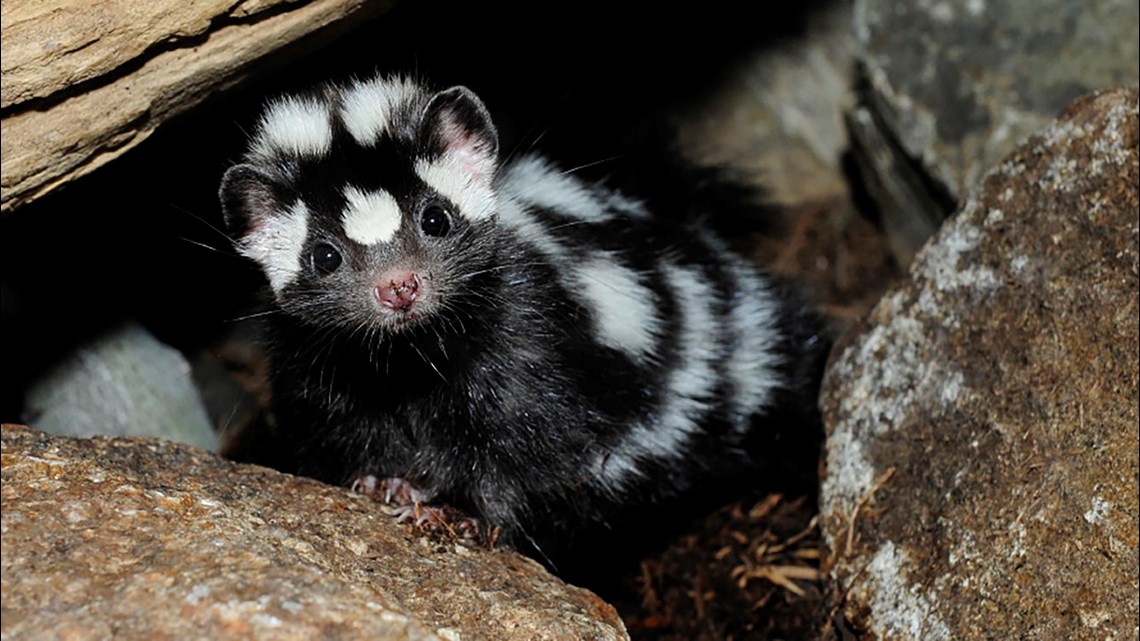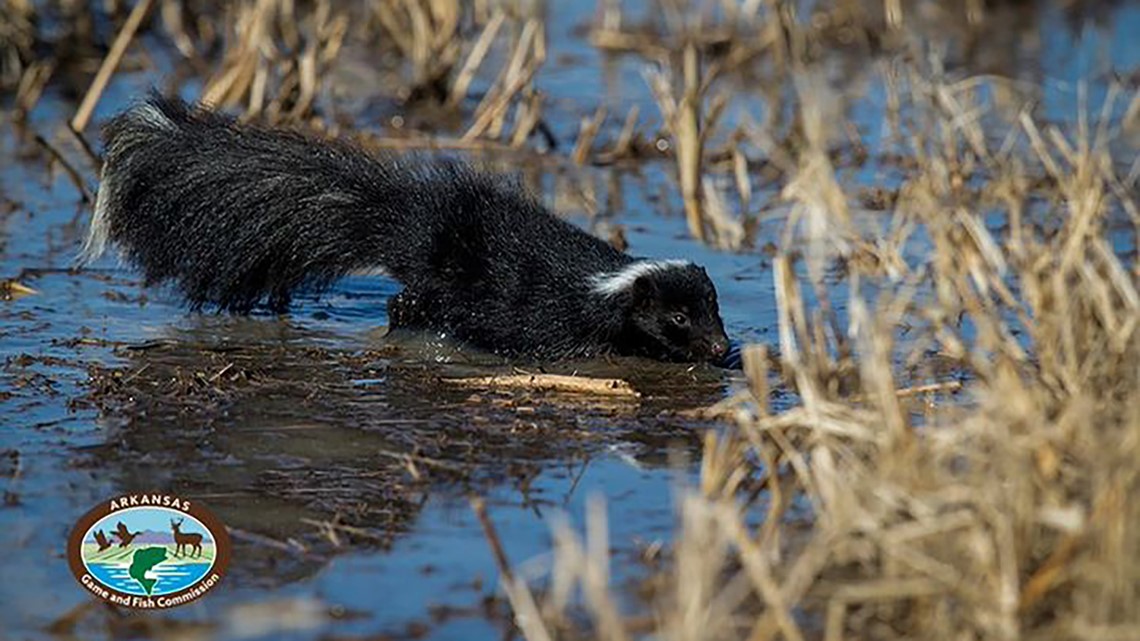ARKANSAS, USA — Although skunks may seem adorable from a distance, the Arkansas Game and Fish Commission (AGFC) categorizes the odor-filled wildlife species as a nuisance.
The mostly nocturnal creatures— who are members of the weasel family— are best known for spewing an inescapable odor when they are feeling threatened.
According to the University of Arkansas's Division of Agriculture, Arkansas is home to the striped skunk and the eastern spotted spunk. The most common skunk, however, is the striped skunk.
The spotted skunk is less common. According to AGFC, more research is required to determine how many there are in the state. If you believe you have spotted the rare breed, the commission encourages Arkansans to email Black.Sasse@afgc.ar.gov.
Why are skunks considered nuisances?
Even though skunks are generally harmless, they still have several behaviors that can be an annoyance or pose a threat to Arkansas residents. According to the U of A, here's how the cute creatures can cause problems.
Settle in homes and damage yards
Skunks typically make cozy nests for the winter months out of rocks, wood piles, culverts, or fallen hollow logs. However, the highly sought-after real estate for skunks is normally under home foundations and porches.
If you suspect a skunk is under your home but are unsure how to prove it, it may be a good idea to check for holes in your yard. During the summer and fall, skunks dig around "1- to 3-inch cone-shaped holes" in search of insects to eat.
In case you have a garden during the summer, they are also known to eat fruit. And for those who have poultry farms, skunks tend to eat chickens and chicken eggs as well.
In the winter and spring, they normally "eat mice, young rabbits, moles, voles, and other small mammals." More specifically, spotted skunks can be useful to keep around because they are "known to be good mousers and will rid a barn of rats."
Produce pervasive odors
Both striped and spotted skunks tend to use their scent glands to ward off any potential threats.
Male skunks also use the stench to attract mates. Striped skunks mate between late February and March, while spotted skunks mate from late March to April.
When humans are around, it's more likely that you will smell a skunk because they feel frightened or trapped. Here's how to spot a skunk getting prepared to spray:
- Jumping
- Stomping their front feet
- Arching their back into a "U" shape with their tail directed at their target
- Shuffling backward
- Move swiftly with their tail raised
- Growling and hissing
According to the U of A, "Spotted skunks will do handstands as a warning and can spray while in this position if necessary." Fortunately, they don't spray as often as their striped family members, but their spray can be more suffocating.
Not only can skunks decide how much spray to emit, but they can also reach a distance of 16 to 20 feet "covering an arc of 30 to 45 degrees."
Once the odor is emitted, it can be smelled within a mile or more of where the skunk has sprayed. The skunk's spray can cause temporary blindness, watery eyes, nasal irritation, and nausea.
Although the symptoms will eventually go away, the smell could last up to two to four months if it's not taken care of. For household remedies to get rid of the potent smell, visit the Division of Agriculture's article.
Can carry rabies
According to the Arkansas Department of Health (ADH), the only reported rabies cases in 2024 so far have been contracted from skunks. The five cases were reported in Johnson, Montgomery, Sharp, White, and Pulaski counties as of March 7, 2024.
In 2023, 28 out of the 40 rabies cases were contracted from skunks. In 2022, skunks caused 17 of the 21 rabies cases in Arkansas.
Due to the high potential of contracting rabies from skunks, it is illegal to transport the animal in or out of Arkansas. It is also illegal to keep them as pets.
According to the U of A, rabid skunks are typically "solitary, aggressive, and unafraid." If you see a skunk in the daylight, you should proceed with caution.


How to keep the skunks away
- Avoid feeding skunks— either on purpose or by accident. If you feed animals outdoors, be sure to only leave enough for one sitting for your animals.
- Close-off entry points to any potential burrowing spots and remove brush piles, lumber piles, or rock piles that could be used for nests.
- Install digging barriers to prevent the skunks from getting around concrete slabs, decks, etc.
- Secure any small farm animals, such as ducks or chickens.
- Keep pets inside at night to help them avoid getting sprayed.
According to AGFC, it is legal to take any nongame wildlife, excluding endangered species, that are posing a threat to any person or property without a Depredation Permit. Under this rule, striped skunks "may be taken year-round, using firearms during daylight hours only by landowners or their designees, in any number, on private property where damage is being committed, or may be trapped and destroyed."
Spotted skunks are illegal to hunt in any capacity due to their rarity. If you are having an issue with a skunk on your property, call AGFC's nuisance wildlife 24-hour hotline at 833-345-0315.


Related:
Watch 5NEWS on YouTube.
Download the 5NEWS app on your smartphone:
Stream 5NEWS 24/7 on the 5+ app: How to watch the 5+ app on your streaming device
To report a typo or grammatical error, please email KFSMDigitalTeam@tegna.com and detail which story you're referring to.

